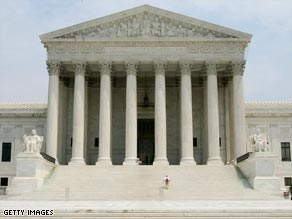Court: Parents can sue school district over harassment claim
- Story Highlights
- Parents allege older boy sexually harassed daughter on school bus
- Parents: School district ignored our concerns, refused to discipline the boy
- U.S. Supreme Court: Parents can sue school district
- Next Article in Crime »
CNN Supreme Court Producer
WASHINGTON (CNN) -- The Supreme Court has given a girl's parents the go-ahead to sue a Massachusetts school district over alleged sexual harassment by another student.

A U.S. Supreme Court ruling allows a couple two avenues to pursue claims against their daughter's school district.
The justices, in a unanimous ruling, allowed the plaintiffs two avenues to make their claims -- a 1972 law banning gender bias in education and a separate civil rights law enacted 138 years ago.
Lisa and Robert Fitzgerald said their then-kindergartner daughter was forced by an older male student to lift her skirt or pull down her underwear. The parents alleged school officials ignored their concerns and refused to discipline the boy.
Federal courts had been split over whether the newer law -- known as Title IX -- displaced any claims made under part of the 1871 civil rights law, called "Section 1983." The Fitzgeralds lost their initial Title IX claims and an appeals court blocked them from pursuing the other legal strategy.
The ruling from the justices now gives the Fitzgeralds the right to continue their lawsuit against school officials.
"We hold that Section 1983 suits based on the Equal Protection Clause remain available to plaintiffs alleging unconstitutional gender discrimination in schools," Justice Samuel Alito wrote.
The plaintiffs allege the incidents happened on a school bus in Barnstable, Massachusetts, in the 2000-01 academic year. The child had told her parents that whenever she wore a dress, a third-grader would make her do things she did not want to do.
Don't Miss
After the mother complained to school officials, the boy denied the allegations. The principal, after interviewing other students and the bus driver, concluded she could not corroborate the girl's version of events.
The principal suggested the girl be transferred to another bus as a possible solution. The Fitzgeralds said that amounted to punishing their daughter and said the boy was the one who should be transferred.
The local police department also looked into the case but concluded there was insufficient evidence to bring criminal charges against the boy.
The parents began driving the girl to school and filed a lawsuit, claiming the schools system's response was inadequate.
School officials denied wrongdoing and tried to limit the case to Title IX, which applies to public or private schools receiving federal aid. The law is credited, among other things, with helping bring equality in sports participation and funding for college women.
"Our concern was that the school district just didn't take things as seriously as they should," said Charles Rothfeld, attorney for the Fitzgeralds. "They were frustrated by what they perceived as indifference by the school."
Rothfeld said the school's behavior was "pretty egregious."
Barnstable school officials did not respond to a request for comment.
The case is Fitzgerald v. Barnstable School Cmte. (07-1125).
All About U.S. Supreme Court • Sexual Offenses • Samuel Alito

 Sit tight, we're getting to the good stuff
Sit tight, we're getting to the good stuff